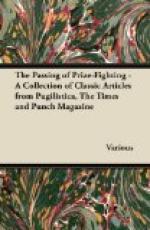Monday, May 21st.—Mr. MACCALLUM SCOTT complained that a question of his relating to the prohibition of “dropped scones”—which Captain BATHURST, that encyclopaedia of food-lore, described as falling “under the same category as the crumpet”—had been addressed to the Ministry of Munitions instead of the Ministry of Food. It was really a venial error on the part of the Clerk at the Table, for the modern scone distinctly suggests a missile of offence, and is much more like a “crump” than a crumpet. If HINDENBURG were acquainted with our London tea-shops (consule DEVONPORT) he would never have imagined that his famous phrase about “biting upon granite” would have any terrors for the British recruit.
When the PRIME MINISTER read from his manuscripts the proposed conditions of the Irish Convention—how it must include representatives not only of political parties, but of Churches, trade unions, commercial and educational interests, and of Sinn Fein itself; and must be prepared to consider every variety of proposal that might be brought before it—an Irish colleague whispered to me, “Sure, the Millennium will be over before we get it.”
Nothing could have been handsomer than Mr. REDMOND’S welcome to the proposal. All he was concerned for, I gathered, was that his Unionist opponents should be generously represented. Ulster, in the person of Sir JOHN LONSDALE, made no corresponding advance. He would submit the proposal to his constituents, but not apparently with letters commendatory.
I daresay Mr. WILLIAM O’BRIEN set out with the honest intention of blessing the Government plan, of which indeed he claims to be the “onlie begetter.” But the sound of his own voice—in its higher tones painfully provocative—stimulated him to proceed to a dramatic indictment of his former colleagues. I felt sorry for the prospective Chairman, charged with the task of attempting to reconcile these opposites.
Mr. HEALY, cowering beneath the shelter of his ample hat, as Mr. O’BRIEN’S arms waved windmill-like above him, must have felt like Sancho Panza when the Don was in an extra fitful mood; but he kept silence even from good words.
The briefest and most helpful speech of the afternoon came from Sir EDWARD CARSON, who, while declaring that he would never desert Ulster, nevertheless made it plain that Ulster on this occasion should take her place beside the rest of Ireland. Only Mr. GINNELL remained obdurate. In his ears the Convention sounds “the funeral dirge of the Home Rule Act.”
[Illustration: PESSIMIST’S DESIGN FOR COSTUME OF CHAIRMAN OF IRISH CONVENTION.]
Tuesday, May 22.—If you should happen to see of a Sabbath morning a stream of official motor-cars leaving London with freights of the brave and the fair you may be sure they are going on some National business. Both the War Office and the Admiralty keep log-books, in which are faithfully entered—I quote Dr. MACNAMARA—“full particulars of each journey, the number and description of passengers carried and the amount of petrol consumed.” Do not therefore jump to the hasty and erroneous conclusion that the gallant fellows and their charming companions are “joy-riding;” such a thing is unknown in Government circles.




